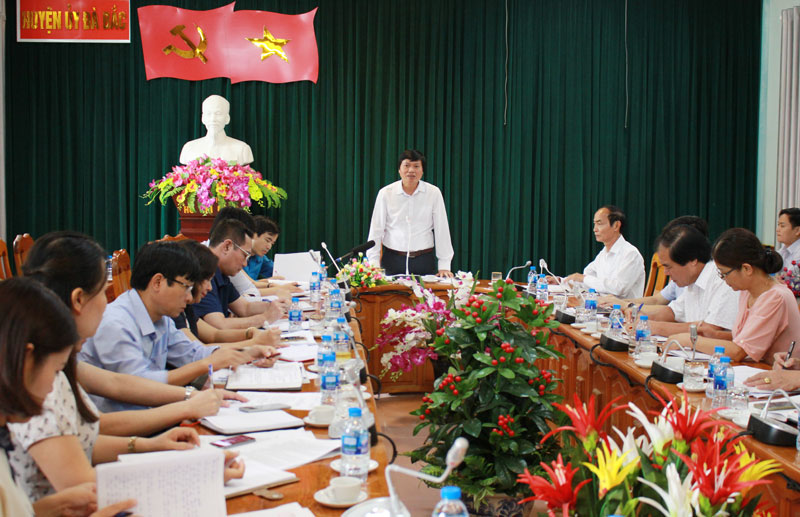
(HBO) – A delegation of Hoa Binh province, led by Permanent Deputy Secretary of the provincial Party Committee and Chairman of the provincial People’s Council Tran Dang Ninh, had a working session with Da Bac district’s Party Committee, focusing on the implementation of political tasks in the first half and major missions in the last six months of 2018.
Photo: Standing Deputy Secretary of the provincial Party
Committee and Chairman of the provincial People’s Council Tran Dang Ninh
concludes the working session.
During the January-June period, the Standing
Board of the district’s Party Committee comprehensively directed all sectors,
focusing on boosting socio-economic development and ensuring defence-security.
Due attention was paid to caring for the life of local people, especially those
in resettlement areas, so that the residents can stabilise their lives after
natural disasters.
The Party building and popularisation of Party
and State’s policies and regulations were accelerated. The district strictly
carried out the Resolution adopted at the fourth plenary meeting of the 11th-
and 12th-tenure Communist Party of Vietnam Central Committee along with the
Politburo’s Directive No. 05.
Also, it reviewed and supplemented the personnel
planning scheme for the 2015-2020 period and following years while encouraging
typical models in all sectors. The Fatherland Front at all levels and many
socio-economic organisations carried out a line-up of practical activities to
support families affected by natural calamities.
Regarding the local socio-economic situation,
production value grew 5.01 percent in the first half of the year and the
economic structure is shifting in line with local directions. The local
authorities worked to assure defence-security and social order.
Speaking highly of the district’s achievements,
Ninh recommended local authorities to focus on taking care of local residents,
from their accommodations, cultivated land to infrastructure.
The district should evaluate and give out
solutions to thoroughly reinforce landslide-prone spots, he said.
The province’s resolutions must be carried out
effectively while mobilisation and religious works should be given special attention.
Resolution adopted at the sixth meeting of the Party Central Committee on
apparatus organisation and improvement of capacity for officials and civil
servants and the Politburo’s Directive No.05 should be implemented
effectively./.
The Standing Board of the Hoa Binh provincial Party Committee has agreed in principle on a proposal by the Standing Board of the Party Committee of Hoa Binh city to gather feedback on the city’s 1:2000 zoning plan, which forms part of its broader urban development strategy.
Hoa Binh province has made notable progress in public administration reform and digital government development, with the satisfaction index among citizens and businesses reaching over 84%, according to recent government evaluations.
Thanks to great efforts by local authorities in recent times, the governance and public administration performance of Mai Chau district has been significantly improved.
In the afternoon of June 6, the Party Committee, the People's Council, the People's Committee and the Fatherland Front of Lac Son district solemnly held a meeting to celebrate the 139th anniversary of the district's founding (1886–2025) and the 79th anniversary of the establishment of the district's Party Committee (1946–2025). There was the attendance of Mr. Bui Van Thang, the Vice Chairman of the Provincial People's Council; Mr. Quach Tat Liem, the Vice Chairman of the Provincial People's Committee; Ms. Dang Bich Ngoc, the Deputy Head of the National Assembly Delegation of the province; as well as the former leaders of the province and district through various periods, who are the natives of the district.
Implementing the Politburo’s Resolution No. 57-NQ/TW on breakthroughs in science – technology, innovation, and digital transformation is a golden opportunity for the northern mountainous province of Hoa Binh to renew growth model, improve competitive edge and shorten digital gap.
Resolution 57-NQ/TW, issued by the Politburo on December 22, 2024, identifies sci-tech, innovation, and digital transformation as strategic breakthroughs to build a developed and prosperous nation. In Hoa Binh province, this spirit is not just a slogan, it’s being put into action through concrete initiatives that form a "new development triangle”: digital citizenship, digital economy, and digital administration.



